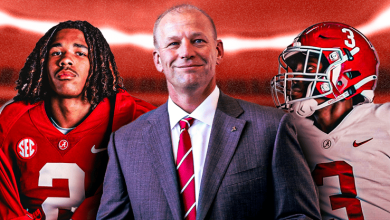Big Ten Commissioner Tony Petitti Argues Michigan Shouldn’t Receive Further Penalties for Sign Stealing in Letter to NCAA.

In a bold and unexpected move, Big Ten Commissioner Tony Petitti has come out strongly in defense of the University of Michigan amid the ongoing controversy surrounding its football program and the alleged sign-stealing scandal. In a letter addressed to the NCAA, Petitti made the case that Michigan should not receive further penalties related to the sign-stealing allegations that have rocked the college football world, arguing that the actions of Michigan’s coaching staff, while concerning, did not rise to the level of sanction-worthy violations.
The sign-stealing controversy has been one of the most talked-about stories in college football in recent years. The allegations revolve around Michigan’s football program and its former staff member, Connor Stalions, who allegedly orchestrated a sophisticated scheme to steal signs from opposing teams. Sign-stealing has long been a part of the game of football, but the methods employed by Stalions—such as sending people to scout future opponents and collecting information on their signals—crossed a line, according to critics, and raised questions about the ethical boundaries of the sport.
As the NCAA investigates the claims, the Big Ten’s response has become a focal point in the discussion. The NCAA and the conference are under increasing pressure to take action, and some have called for Michigan to be penalized for its involvement in the scandal. However, Petitti, who assumed his role as Big Ten Commissioner in 2023, has taken a nuanced stance. In his letter to the NCAA, Petitti made the argument that Michigan should not face further penalties, citing several factors that he believes mitigate the situation.
First and foremost, Petitti emphasized that Michigan had already taken appropriate internal measures to address the issue. According to the letter, Michigan had initiated its own investigation into the allegations and, once the actions of Stalions came to light, had taken swift action to terminate his employment. The school also imposed a ban on future sign-stealing activities and pledged to work with the NCAA to ensure such behavior would not occur again.
“The University of Michigan has demonstrated a commitment to addressing this issue transparently and has taken swift action to remove the individuals involved,” Petitti wrote. “The actions of one staff member should not be seen as representative of the entire program or its leadership. The school has shown accountability, and it would be unjust to penalize the institution as a whole.”
Petitti’s argument hinges on the concept of institutional responsibility. While Michigan did not deny that Stalions acted improperly, the Big Ten Commissioner maintains that the actions of one rogue individual should not necessarily result in harsh sanctions for the entire university. In this light, Petitti is advocating for a measured approach, one that distinguishes between the actions of individuals and the broader culpability of the institution as a whole.
A central aspect of Petitti’s letter was his argument that Michigan’s actions were not as severe as the allegations might suggest. The letter points to the fact that sign-stealing, while prohibited in some forms, is not explicitly prohibited in others. In fact, many teams in college football, including Michigan itself, engage in some form of sign-stealing during games, as long as it does not involve unethical methods like spying or using electronic devices. According to Petitti, the act of stealing signs is a long-standing tradition in football, and the methods used by Stalions, while improper, did not constitute a major violation when compared to other offenses in the sport.
“In the world of football, teams have always sought competitive advantages, and sign-stealing, in and of itself, is not an offense that is clearly defined as a violation of NCAA rules,” Petitti argued. “We must take into account the context of this situation and the fact that Michigan’s coaching staff did not directly participate in or condone the actions of the individual involved.”
This defense of Michigan’s actions may come as a surprise to many, especially given the widespread outrage and criticism the program has faced since the allegations came to light. Michigan has been under a microscope since the sign-stealing scandal broke, with many accusing the program of cheating and attempting to gain an unfair advantage over its opponents. Some fans and analysts believe that Michigan’s success in recent years—particularly in its rivalry with Ohio State—can be partially attributed to the alleged sign-stealing activities. As a result, there have been calls for the program to face significant punishment, including fines, suspensions, or even vacating wins.
However, Petitti contends that such penalties would be excessive, particularly when one takes into account the specific nature of the violations. While acknowledging that sign-stealing is a serious matter, Petitti stressed that the level of wrongdoing in this case does not warrant draconian measures.
“While we understand the concerns that have been raised, it is important that we take a step back and assess the situation in a fair and balanced manner,” Petitti wrote. “Further punishment, in this case, would set a dangerous precedent, penalizing an entire program for the actions of a single individual. Such a response would have wide-ranging consequences for the future of college athletics and would send a message that individual misconduct should be treated as a reflection of an entire institution.”
Petitti’s stance is notable for its emphasis on fairness and proportionality. Rather than advocating for severe penalties, the commissioner calls for the NCAA to consider alternative measures, such as implementing new policies or procedures to prevent sign-stealing in the future, or requiring additional oversight of Michigan’s football program moving forward. Petitti also suggested that the Big Ten Conference could play a role in monitoring Michigan’s compliance with NCAA rules, ensuring that any future violations are quickly addressed.
Some observers have noted that Petitti’s defense of Michigan could be motivated by a desire to avoid setting a precedent that would create a chaotic environment in college athletics. The sign-stealing scandal is part of a broader trend of increased scrutiny on college football programs, with many schools facing allegations of misconduct or rule-breaking in the wake of recent scandals. Petitti’s argument suggests that punishing Michigan too severely could lead to a slippery slope, where the actions of individuals are blamed on entire programs, resulting in overreaching penalties that hurt the integrity of college sports.
Still, there are others who believe that Petitti’s position is too lenient, and that Michigan’s involvement in the sign-stealing scandal warrants a stronger response from both the Big Ten and the NCAA. Critics argue that the use of illegal methods to steal signs undermines the integrity of the game and puts other teams at a competitive disadvantage. They also point out that the University of Michigan is a flagship institution with significant resources, and as such, should be held to the highest standard of accountability.
Michigan’s success in recent years, particularly its back-to-back victories over Ohio State and its strong performances in the Big Ten Championship, has led some to speculate that sign-stealing played a role in its rise to prominence. These critics contend that the program’s dominance—along with its ability to consistently outsmart opponents—may have been fueled, in part, by the sign-stealing scheme. As a result, they argue that the NCAA and the Big Ten should impose substantial sanctions to ensure fairness and protect the integrity of the sport.
Despite these concerns, Petitti remains steadfast in his belief that Michigan has acted appropriately and should not face further penalties. The commissioner’s letter to the NCAA signals that the Big Ten is taking a measured approach to the situation, one that prioritizes fairness and proportionality over heavy-handed punishment.
“The University of Michigan has shown a willingness to address the situation head-on and make the necessary changes to ensure that this does not happen again,” Petitti concluded in his letter. “While we understand the gravity of the allegations, we urge the NCAA to consider the broader context of this case and refrain from taking actions that would unjustly punish an entire program for the actions of one individual.”
Petitti’s letter to the NCAA has sparked intense debate across the college football landscape. For some, his stance is seen as a reasonable response to a complex and nuanced situation, one that acknowledges both the seriousness of the allegations and the steps Michigan has taken to address them. For others, it is a failure to hold the university accountable for what could be seen as an attempt to gain an unfair advantage.
As the NCAA continues its investigation into the sign-stealing scandal, Petitti’s letter will likely be a key factor in shaping the conversation moving forward. The Big Ten Commissioner’s argument reflects a growing sentiment within college sports that, while misconduct should be punished, penalties should be fair, transparent, and proportional to the offenses committed. How the NCAA responds to the controversy will have significant implications not only for Michigan, but for the future of college football as a whole. The debate over sign-stealing and the role of governing bodies like the NCAA will undoubtedly continue for years to come.









